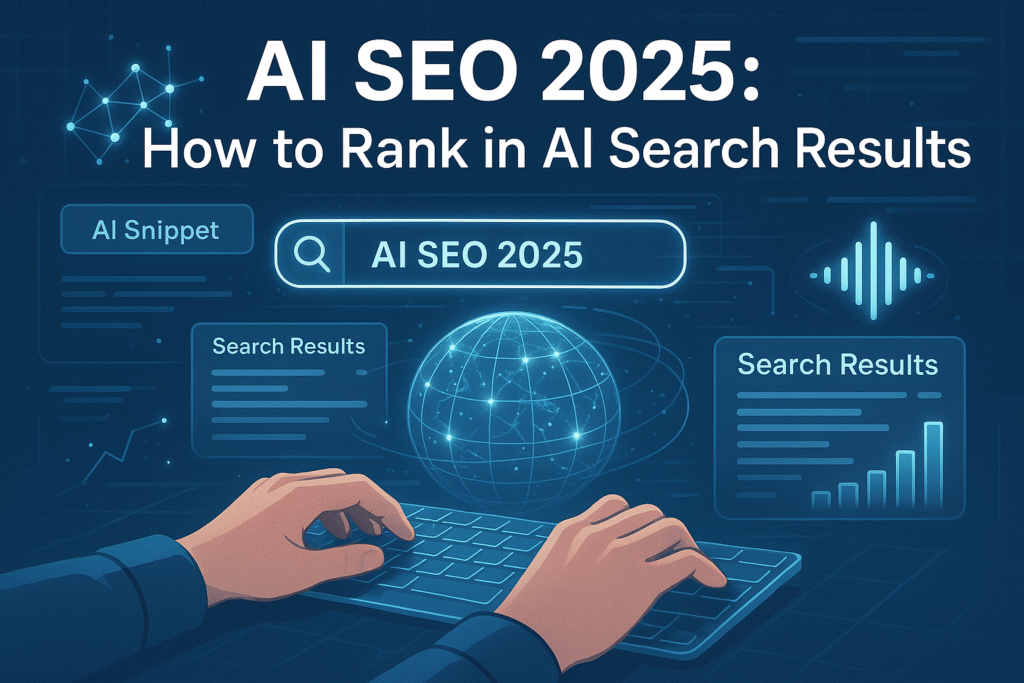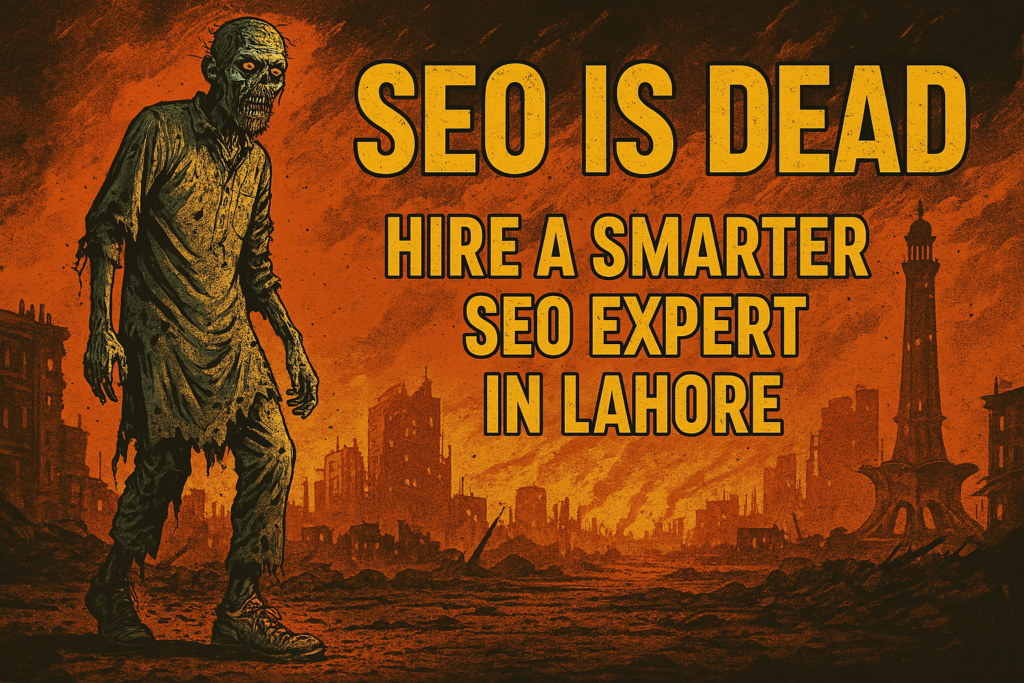AI SEO 2025: How to Rank in AI Search Results Across SGE, ChatGPT, and Bard
The key AI search trends for 2025 include real-time generative results, multimodal ranking signals, entity-based SEO, AI Overviews (SGE) dominance, and the rise of zero-click answers. Ranking in AI search now demands optimization for natural language, structured data, and conversational queries. Brands must pivot from keyword stuffing to contextual, expert-driven content that answers intent-rich questions with high clarity and relevance.
Table of Contents
-
Understanding AI-Powered Search in 2025
-
How Google’s AI Overview Impacts Rankings
-
The Shift to Natural Language & Voice Search
-
Entity-Based Search: The New Backbone of Ranking
-
Structured Data & Schema for AI Discovery
-
Personalized & Contextual Search: The US Market Edge
-
Future-Proofing Your AI Search Strategy (2025–2026)
-
FAQs
1️⃣ Understanding AI-Powered Search in 2025
AI search in 2025 is no longer just about links and snippets, it’s about meaning, context, and multimodal relevance. Generative AI models like SGE (Search Generative Experience), ChatGPT, Perplexity, and Bing Copilot now synthesize answers using NLP and retrieval-augmented generation (RAG), pulling not only from websites but structured knowledge graphs, PDFs, videos, and real-time forums.
🔍 Example:
When a user asks:
“What’s the best project management software for startups in 2025?”
Google SGE doesn’t just return a list—it creates an AI-generated comparison with links, tables, brand summaries, and even pricing models.
💡 Actionable Insight:
To rank in these AI-generated blocks, your content must:
-
Be structured, trustworthy, and authoritative.
-
Use semantic depth, not keyword frequency.
-
Include conversational answers to common search prompts.
2️⃣ How Google’s AI Overview Impacts Rankings
Google’s AI Overview is a major disruptor. Introduced in 2023 and now default in 2025, this feature pushes organic results further down the page. It synthesizes top content sources into one instant answer, often with no click required.
🎯 What it Means for SEO:
-
Position #1 is now the AI Summary box.
-
Content must be cited, quoted, or referenced within the large language model’s retrieval set.
🧠 How to Get Cited in AI Overviews:
-
Include clear answers near the top of your article.
-
Add FAQ sections using natural, voice-friendly questions.
-
Use structured data like
FAQPage,HowTo, andWebPageschema. -
Publish under authoritative profiles and link to credible sources.
In AI search, you don’t just rank you get chosen. Train the algorithm to recognize your authority.” Muhammad Sukhera, AEO & Growth Strategist
By 2025, over 60% of AI search queries are now voice-activated or natural language prompts, according to Statista. AI models prioritize responses that mimic human conversation and answer in full context.
🗣 Common Voice Search Prompts:
-
“How do I…”
-
“What’s the best way to…”
-
“Why should I choose…”
-
“Is it worth it to…”
📘 Best Practices for Voice/NLP Optimization:
-
Start answers with Yes, No, or a direct statement.
-
Break complex answers into short, conversational paragraphs.
-
Use lists, tables, and step-by-step formats.
-
Avoid passive voice and jargon.
🎤 Example:
Q: “How does Google’s AI choose which website to cite?”
A: Google’s AI Overview cites websites that offer direct, clear, and structured answers aligned with the user’s query intent. It also prefers expert-backed sources, schema-enhanced content, and semantically rich answers
4️⃣ Entity-Based Search: The New Backbone of Ranking
Google and OpenAI’s search engines now prioritize entities over keywords. Entities are understood as unique, linked concepts like “Tesla,” “Affiliate Marketing,” or “Vitamin D Deficiency,” connected through a knowledge graph.
AI doesn’t rank keywords, it ranks entities and their relationships. Speak in concepts, not just content.” Muhammad Sukhera, AEO Growth Strategist
 Structured Data & Schema for AI Discovery
Structured Data & Schema for AI Discovery
AI-powered search loves structured data. Whether it’s Google’s Knowledge Vault or OpenAI’s Retrieval plugins, structured content formats make information machine-readable and snippet-friendly.
 Key Schema Types to Implement:
Key Schema Types to Implement:
-
FAQPage -
HowTo -
Article -
WebPage -
Organization,LocalBusiness,Author -
VideoObject(for YouTube/Shorts optimization) -
BreadcrumbListfor navigation context
 Bonus Tip: Featured Snippet Formula
Bonus Tip: Featured Snippet Formula
Structure answers in the following format:
-
Direct Answer (≤ 40 words)
-
Supporting Detail (50–150 words)
-
Example or List (optional)
“AI doesn’t surf it selects. Build your content to be chosen, not just found.” Muhammad Sukhera, AEO & Growth Strategist
 Personalized & Contextual Search: The US Market Edge
Personalized & Contextual Search: The US Market Edge
In the United States, AI-driven engines like Bard, Perplexity, and ChatGPT personalize results based on:
-
Search history
-
Location
-
Device behavior
-
Calendar/email/Google Workspace data (if opted-in)
 Local Search Ranking Factors to Consider:
Local Search Ranking Factors to Consider:
| Factor | Weight in AI Search |
|---|---|
| Geo-specific Entity Relevance |  High High |
Location Markup (LocalBusiness) |
 Essential Essential |
| Mobile Optimization |  Non-negotiable Non-negotiable |
| Contextual Search Paths (e.g., “near me”, “in my city”) |  Vital Vital |
 Example:
Example:Q: “Best weight loss clinics near me that offer Ozempic?”
A: In AI search, local clinics with structured service pages, patient reviews, schema, and E-E-A-T content will appear in voice-generated AI local results before map packs.
Future-Proofing Your AI Search Strategy (2025–2026)
 Predictive AI Search Trends (Next 6–12 Months):
Predictive AI Search Trends (Next 6–12 Months):
| Trend | Description | Action |
|---|---|---|
 RAG-Enhanced SGE RAG-Enhanced SGE |
Generative AI will prefer RAG (Retrieval Augmented Generation) sources over crawled web. | Publish structured, high-trust documents (whitepapers, PDFs). |
 Multimodal Results Multimodal Results |
Search will blend voice, video, images, and text answers. | Use descriptive alt-text, transcripts, captions, and schema. |
 E-E-A-T Personalization E-E-A-T Personalization |
AI will prioritize known authors/entities. | Create author bios, credentials, and citation-worthy content. |
 Source Diversity Source Diversity |
AI will reference clusters of content, not one page. | Build topic hubs interlinked through pillar-cluster strategy. |
 Real-Time Freshness Real-Time Freshness |
Daily-updated or time-stamped content will rank higher. | Add datePublished, dateModified, and RSS feeds to pages. |
 Design for Constant Updates:
Design for Constant Updates:-
Modular blocks = easy updating.
-
Schema = easy reindexing.
-
Internal links = better crawlability.
“Every page is a training signal for AI design it as a knowledge asset, not just a post.” Muhammad Sukhera, AEO & Growth Strategist
8️⃣ FAQs
Q1. How does Google’s AI Overview impact organic rankings?
Google’s AI Overview often replaces top organic listings with generative answers, pushing traditional results down. Content that is cited in AI summaries benefits from high visibility.
Q2. What’s the best way to get featured in AI search results?
Structure content with schema, answer questions clearly, and focus on entity-based authority to increase your chances of citation in AI-generated results.
Q3. Why is structured data important for AI SEO?
Structured data allows AI to parse, extract, and generate accurate summaries from your content. It improves visibility in snippets, overviews, and voice responses.
Q4. What type of content ranks best in AI search?
Expert, conversational, structured content that directly answers questions in contextually relevant language tends to perform best.
Q5. How do I know if AI is citing my website?
Monitor your analytics for traffic from AI tools like Bard, ChatGPT plugins, Perplexity, and look for direct answer placement in Google’s SGE.
Q6. What is entity-based SEO and how does it work?
Entity SEO involves optimizing content around specific people, places, brands, or concepts. AI understands these entities and their relationships to improve ranking relevance.
Q7. How do I optimize my site for ChatGPT and Bing Copilot?
Use a modular content structure, cite credible sources, include FAQs, and ensure your information is up-to-date and easily extractable.
Q8. Is voice search optimization still relevant in 2025?
Yes. Over 60% of generative search queries mimic natural speech. Voice-optimized content is prioritized by AI tools like Siri, Alexa, and SGE.
Q9. How often should I update my AI-optimized content?
Aim for quarterly updates with modified dates, refreshed facts, and re-submission to search consoles. Freshness is now a key AI ranking signal.
Q10. What’s the fastest way to improve AI search visibility?
Focus on one high-authority, well-structured content hub with schema, internal links, FAQs, and natural-language Q&A formats.



